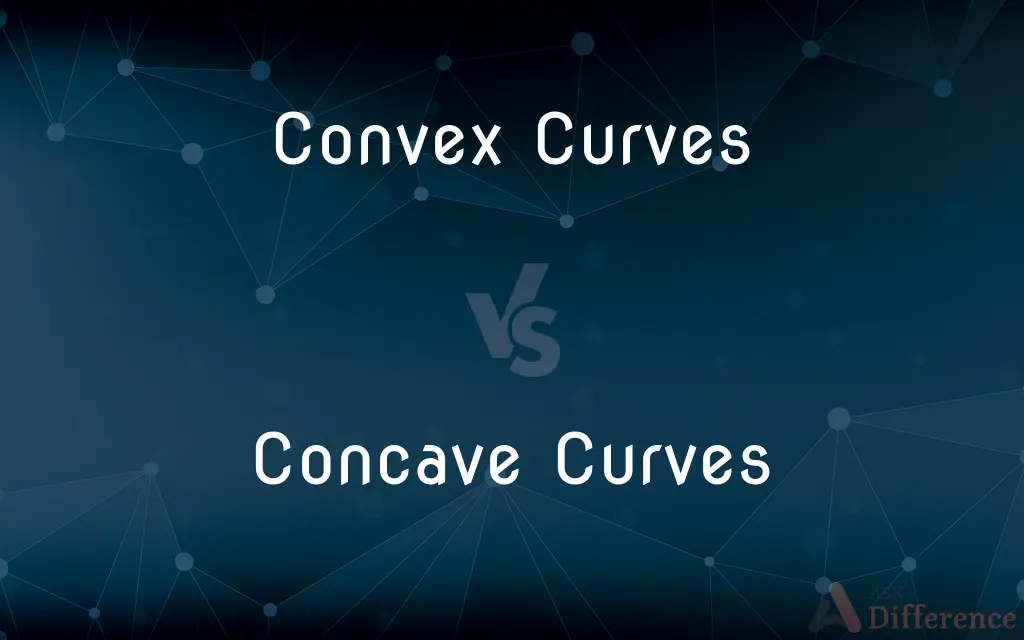Convex Curves vs. Concave Curves — What's the Difference?
Edited by Tayyaba Rehman — By Fiza Rafique — Published on November 21, 2023
Convex Curves bulge outward, whereas Concave Curves curve inward. Both refer to the direction and shape of curves.

Difference Between Convex Curves and Concave Curves
Table of Contents
ADVERTISEMENT
Key Differences
Convex Curves, by definition, are those that protrude or bulge outward. On the contrary, Concave Curves are those that have an inward curvature. This distinction between Convex Curves and Concave Curves is fundamental in geometry and various other fields.
In a Convex Curve, any line segment drawn between two points on the curve lies entirely above or on the curve itself. For Concave Curves, this line segment will pass below or inside the curve. The difference between Convex Curves and Concave Curves can be vividly seen using this segment approach.
When visualizing Convex Curves, think of the outer surface of a sphere or the exterior of a circle. This outward bulging shape is characteristic of Convex Curves. In contrast, Concave Curves are reminiscent of the interior of a cave or the inner surface of a bowl, curving inwards.
Convex Curves can be seen in many everyday objects like the exterior of a balloon or the back of a spoon. Comparatively, Concave Curves are evident in objects like satellite dishes or the interior of a spoon. Both Convex Curves and Concave Curves are integral in design, architecture, and various sciences.
One crucial distinction between Convex Curves and Concave Curves is in optics. Convex Curves, when applied to lenses, diverge light rays, whereas Concave Curves, when referring to lenses, converge light rays. This difference fundamentally shapes their usage in lenses and mirrors.
ADVERTISEMENT
Comparison Chart
Basic Definition
Bulge or protrude outward
Curve or recess inward
Line Segment Test
Lies entirely above or on the curve
Passes below or inside the curve
Visual Example
Outer surface of a sphere
Inner surface of a bowl
Everyday Object
Back of a spoon
Interior of a spoon
Optical Behavior
In lenses, diverge light rays
In lenses, converge light rays
Compare with Definitions
Convex Curves
Convex Curves are characterized by their protruding shape.
Hills often have Convex Curves at their peaks.
Concave Curves
Concave Curves have an inward direction of curvature.
The cave's entrance exhibited Concave Curves.
Convex Curves
Convex Curves ensure that line segments between two points lie above the curve.
The Convex Curves of the lens made it bulge outward.
Concave Curves
In optics, Concave Curves focus light rays.
Telescopes use Concave Curves to gather and focus light.
Convex Curves
Convex Curves are opposite to concave in terms of curvature.
The outside of a bowl showcases Convex Curves.
Concave Curves
Concave Curves are the opposite of convex in shape characteristics.
The inside of a spoon demonstrates Concave Curves.
Convex Curves
Convex Curves in optics diverge light rays.
Convex Curves in mirrors scatter the light rays.
Concave Curves
Concave Curves resemble the inside surface of a circular entity.
The crater had distinct Concave Curves.
Convex Curves
Convex Curves are outward-bulging curves.
The exterior of the bubble displayed Convex Curves.
Concave Curves
Concave Curves ensure line segments between two points pass inside the curve.
The dish antenna, with its Concave Curves, captures signals effectively.
Common Curiosities
What's the primary difference between Convex Curves and Concave Curves?
Convex Curves bulge outward, while Concave Curves curve inward.
What's a simple everyday example of a Concave Curve?
The inside of a spoon represents a Concave Curve.
How do Concave Curves behave in optics?
Concave Curves converge or focus light rays.
Are Convex Curves always completely bulging out?
Not necessarily, the degree of curvature can vary, but the general direction is outward.
Can mirrors have Concave Curves?
Yes, concave mirrors are common and focus light to a point.
What's a practical application of Convex Curves in optics?
Convex lenses are used in farsightedness correction glasses.
Do both Convex and Concave Curves play a role in vehicle design?
Yes, both are considered for aerodynamics, aesthetics, and function.
Can an object have both Convex and Concave Curves?
Yes, many objects, like eyeglass lenses, can have both Convex and Concave Curves.
In optics, how do Convex Curves affect light rays?
Convex Curves diverge or spread out light rays.
How can I visually test the difference between Convex and Concave Curves?
Drawing a line segment between two points on the curve can help; if it's above or on the curve, it's convex, inside means it's concave.
Why are satellite dishes shaped with Concave Curves?
Concave Curves help focus the incoming signals to a specific point for better reception.
How are Concave Curves used in architecture?
They're often used in amphitheaters or sound dishes to focus sound.
Are both Convex and Concave Curves essential in design?
Absolutely, they influence aesthetics, functionality, and ergonomics.
Can the curvature of Convex and Concave Curves affect strength in structures?
Yes, curvature can influence stress distribution and structural strength.
How do Convex Curves appear in nature?
Hills, mounds, or the exterior of fruits like oranges showcase Convex Curves.
Share Your Discovery

Previous Comparison
Dew Point vs. Humidity
Next Comparison
Lager Beer vs. Strong BeerAuthor Spotlight
Written by
Fiza RafiqueFiza Rafique is a skilled content writer at AskDifference.com, where she meticulously refines and enhances written pieces. Drawing from her vast editorial expertise, Fiza ensures clarity, accuracy, and precision in every article. Passionate about language, she continually seeks to elevate the quality of content for readers worldwide.
Edited by
Tayyaba RehmanTayyaba Rehman is a distinguished writer, currently serving as a primary contributor to askdifference.com. As a researcher in semantics and etymology, Tayyaba's passion for the complexity of languages and their distinctions has found a perfect home on the platform. Tayyaba delves into the intricacies of language, distinguishing between commonly confused words and phrases, thereby providing clarity for readers worldwide.













































